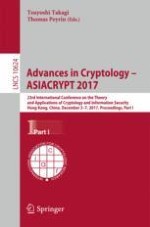2017 | OriginalPaper | Buchkapitel
Maliciously Secure Oblivious Linear Function Evaluation with Constant Overhead
verfasst von : Satrajit Ghosh, Jesper Buus Nielsen, Tobias Nilges
Erschienen in: Advances in Cryptology – ASIACRYPT 2017
Aktivieren Sie unsere intelligente Suche, um passende Fachinhalte oder Patente zu finden.
Wählen Sie Textabschnitte aus um mit Künstlicher Intelligenz passenden Patente zu finden. powered by
Markieren Sie Textabschnitte, um KI-gestützt weitere passende Inhalte zu finden. powered by
